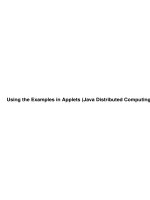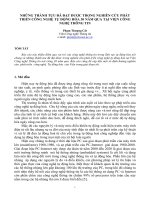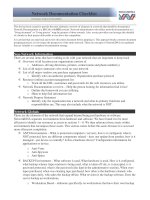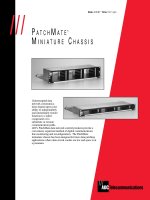Tài liệu Network Simulator ns-2 pptx
Bạn đang xem bản rút gọn của tài liệu. Xem và tải ngay bản đầy đủ của tài liệu tại đây (718.07 KB, 59 trang )
Network Simulator ns-2
2
Agenda
Introduction
Interface
Tcl and OTcl
TclCL
Simulator
Wired network
Wireless network
Program Assignment
3
Introduction
NS-2: network simulator version 2
Discrete event simulator
Packet level simulation
Features
Open source
Scheduling, routing and congestion control
Wired networks: P2P links, LAN
Wireless networks: terrestrial (ad-hoc, cellular;
GPRS, UMTS, WLAN, Bluetooth), satellite
Emulation and trace
4
NS-2: Paradigm
Object-oriented programming
Protocol layering
Modularity and extensibility
Large scale simulation
Maintenance and reusability
Split-language programming
Scripting language (Tcl)
System programming language (C)
5
NS-2: Split Languages
Tcl scripts (Tcl/OTcl)
Interpreted (interactive)
Setup and configuration
C codes (C/C++)
Compiled (efficient)
Algorithms and protocols
TclCL (OTcl/C++)
Link Tcl/OTcl scripts and C/C++ codes
Provide a layer of C++ glue over OTcl
6
NS-2: Split Objects
OTcl
C++
Pure OTcl
objects
Pure C++
objects
OTcl/C++ split objects
NS-2
TclCL linkage
7
NS-2: A Tcl Script Example
/home>ns abc.tcl
/home>abc.tcl
#!/home/hsieh/ns-allinone-2.27/bin/ns
set ns [new Simulator]
set nf [open out.tr w]
$ns trace-all $nf
for {set i 0} {$i<2} {incr i} { ;# create the nodes
set n($i) [$ns node]
}
$ns duplex-link $n(0) $n(1) 1Mb 10ms DropTail
# Create a UDP agent
set udp(src) [new Agent/UDP]
$udp(src) set packetSize_ 500
$ns attach-agent $n(0) $udp(src)
proc finish {} {
global ns nf
$ns flush-trace; close $nf
}
$ns at 5.0 "finish"
$ns run
8
NS-2: A C++ Code Example
static class UdpAgentClass : public TclClass {
public:
UdpAgentClass() : TclClass("Agent/UDP") {}
TclObject* create(int, const char*const*) {
return (new UdpAgent());
}
} class_udp_agent;
UdpAgent::UdpAgent() : Agent(PT_UDP), seqno_(-1)
{
bind("packetSize_", &size_);
}
void UdpAgent::sendmsg(int nbytes, AppData* data, const char* flags)
{
Packet *p;
p = allocpkt();
hdr_cmn::access(p)->size() = size_;
hdr_rtp::access(p)->seqno() = ++seqno_;
p->setdata(data);
target_->recv(p);
}
9
TclCL: Class TclObject
Base class in NS-2 for split objects
Mirrored in both C++ (TclObject) and OTcl
(SplitObject)
Usage
Instantiation, bind and command
Example
set tcp [new Agent/TCP]
$tcp set window_ 30
$tcp advanceby 5000
10
Class TclObject: Hierarchy
SplitObject
Agent
Agent/TCP
Agent/TCP
OTcl object
_o123
Agent/TCP
C++ object
*tcp
TclObject
Agent
TcpAgent
OTcl class
hierarchy
C++ class
hierarchy
Connector
11
Class TclObject: Binding
Bi-directional variable bindings
Link C++ member variables (compiled) to OTcl
instance variables (interpreted)
Initialization through the closest OTcl class
variable
Agent/TCP set window_ 50
Do all initialization of bound variables in
~ns/tcl/lib/ns-default.tcl
Otherwise a warning will be issued when the
shadow compiled object is created
12
Class TclObject: Binding
C++
TcpAgent::TcpAgent() {
bind(“window_”, &wnd_);
… …
}
bind(), bind_time(), bind_bool(), bind_bw()
OTcl
Agent/TCP set window_ 50
set tcp [new Agent/TCP]
$tcp set window_ 100
13
Class TclObject: Command
Invoke C++ compiled functions through OTcl
interpreted methods
A way of implementing OTcl methods in C++
Hook point
Tcl method unknown{}
OTcl method cmd{}
Send all arguments after cmd{} call to
TclObject::command()
Use Tcl::resultf() in C++ to pass back
results
14
Class TclObject: Command
$tcp cmd send
match
“send”?
Invoke parent:
return Agent::command()
process and return
Yes
No
OTcl space
C++ space
no such
procedure
SplitObject::unknown{}$tcp send
TcpAgent::command()
15
Class TclObject: Command
OTcl
set tcp [new Agent/TCP]
$tcp advance 100
C++
int TcpAgent::command(int argc,
const char*const* argv) {
if (argc == 3) {
if (strcmp(argv[1], “advance”) == 0) {
int newseq = atoi(argv[2]);
……
return TCL_OK;
}
}
return (Agent::command(argc, argv);
}
16
TclCL: Summary
Class TclObject
Unified interpreted (OTcl) and compiled (C++)
class hierarchies
Seamless access (procedure call and variable
access) between OTcl and C++
Class TclClass
Mechanism that makes TclObject work
Class Tcl
Primitives to access OTcl interpreter
17
NS-2: Directory Structure
TK8 OTcl TclCLTcl8 ns-2 nam-1
tcl
ex test
lib
...
...
examples
validation tests
C++ code
OTcl code
ns-allinone
mcast
...
( />Network Simulator ns-2
Part II: Wired Network
19
Class Hierarchy
TclObject
NsObject
Connector Classifier
Delay
PortClassifier
Agent
AddrClassifier
Queue Trace
DropTail RED TCP Enq Deq Drop
Reno SACK
Vegas
Process
Application
Node
FTP
target_
recv()
Scheduler
20
Simulation Elements
Create the event scheduler (simulator)
[Setup tracing]
Create network topology
[Setup routing]
[Insert error modules/network dynamics]
Create connection (transport)
Create traffic (application)
Start the scheduler
Post-process data
21
Event Scheduler
Create event scheduler
set ns [new Simulator]
Schedule events (OTcl)
OTcl: $ns at <time> <TCL_command>
C++: Scheduler::schedule(h,e, delay)
Obtain simulation time
OTcl: $ns now
C++: Scheduler::clock()
Start scheduler
$ns run
The last line of your OTcl script
22
Trace
Trace packets on all links
$ns trace-all [open nstr.out w]
<event> <t> <from> <to> <pkt> <size> -- <fid> <src> <dst> <seq> <uid>
<event> <t> <from> <to> <pkt> <size> -- <fid> <src> <dst> <seq> <uid>
+ 1 0 2 cbr 210 ------- 0 0.0 3.1 0 0
+ 1 0 2 cbr 210 ------- 0 0.0 3.1 0 0
- 1 0 2 cbr 210 ------- 0 0.0 3.1 0 0
- 1 0 2 cbr 210 ------- 0 0.0 3.1 0 0
r 1.00234 0 2 cbr 210 ------- 0 0.0 3.1 0 0
r 1.00234 0 2 cbr 210 ------- 0 0.0 3.1 0 0
$ns namtrace-all [open namtr.out w]
Turn on tracing on specific links
$ns trace-queue $n0 $n1
$ns namtrace-queue $n0 $n1
Output trace to /dev/null if not desired
23
Network Topology
Nodes
set n0 [$ns node]
set n1 [$ns node]
Links and queues
$ns duplex-link $n0 $n1 \
<bandwidth> <delay> <queue>
queue: DropTail, RED, CBQ, FQ, …
Link delay = f (bandwidth, delay)
= packet transmission time + propagation delay
24
Network Topology: Node
n0 n1
Addr
Classifier
Port
Classifier
classifier_
dmux_
entry_
Node entry
Unicast Node Multicast Node
Multicast
Classifier
classifier_
dmux_
entry_
Node entry
multiclassifier_
25
Network Topology: Link
n0 n1
enqT_ queue_ deqT_
drophead_
drpT_
link_ ttl_
n1
entry_
head_
tracing
simplex link
duplex link









